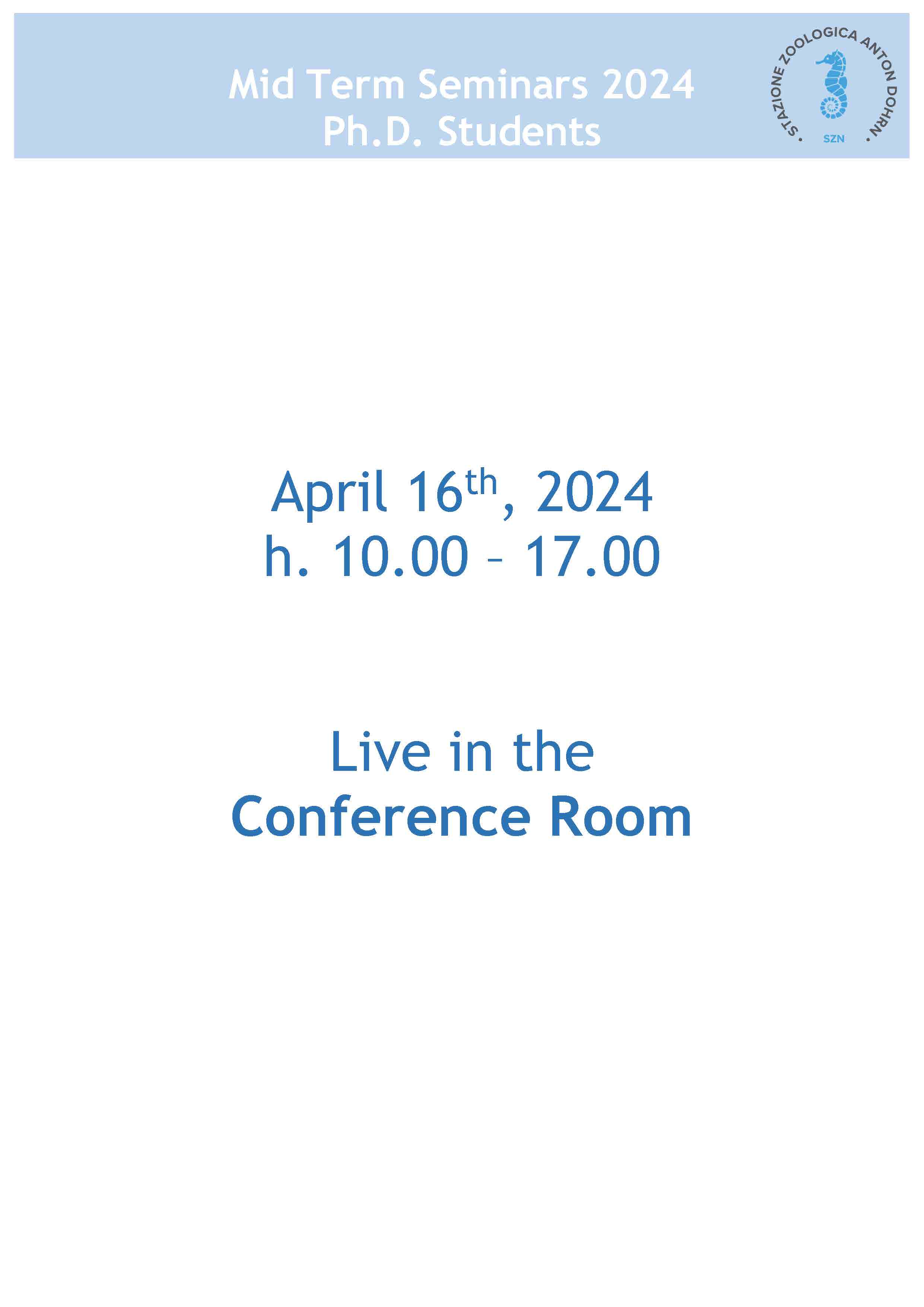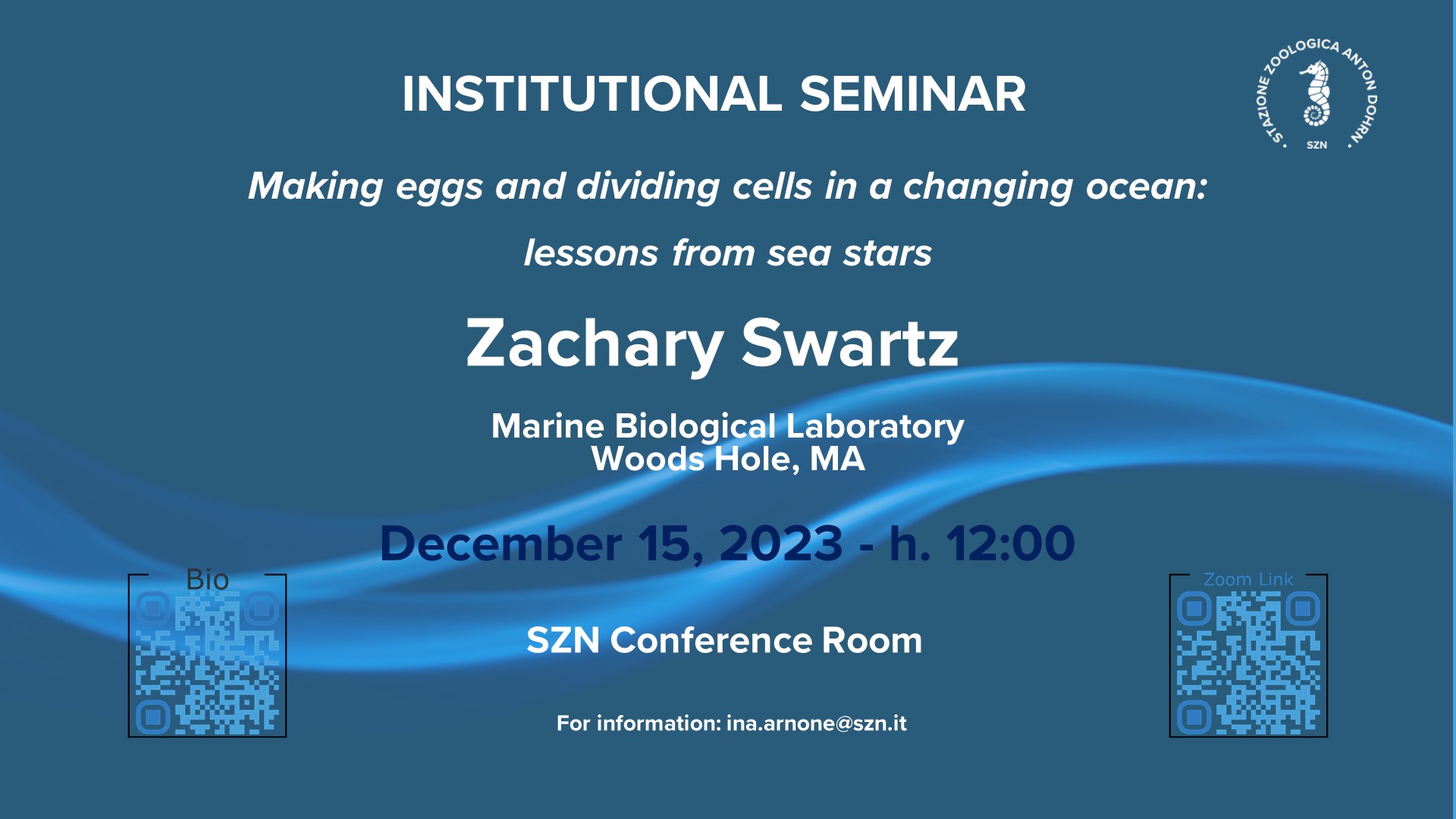News
The PhD project will be conducted in collaboration between the University of Pisa and the Stazione Zoologica Anton Dohrn.
We invite applications for a PhD student to work with Dr Ulisse Cardini and Prof Fabio Bulleri on “Nested microbial interactions in seagrass ecosystems”
To apply, please follow this link and the guidelines therein.
The application deadline is June 20, 2024
MultidisciPLinary Approach for the STudy of plastic litter pollution in MEDiterranean ecosystems:
from impacts to potential solutions
OCTOBER 22nd-25th, 2024 Stazione Zoologica Anton Dohrn
CRIMAC - Research Centre and Marine Advanced Infrastructures in Calabria Amendolara (CS) - Italy
PLASTMed will be the first edition of “CRIMAC Summer School” and will take place from the 22nd to the 25th of October, at the Research Centre and Marine Advanced Infrastructures in Calabria, Stazione Zoologica Anton Dohrn, in Amendolara (CS).
The PLASTMed Summer School will consist of 4 days and will focus on plastic marine pollution in the Mediterranean Sea, dealing with both biotic and abiotic environmental matrices, through a multidisciplinary approach (ecological, biotechnological and toxicological).
Contact us: This email address is being protected from spambots. You need JavaScript enabled to view it.
For more info: https://rb.gy/b6hyfs

High levels of plastic pollution can kill the embryos of a wide range of ocean animals, new research shows.
Scientists tested the effects of new PVC pellets (pre-production “nurdles” used to make many plastic products) on the development of ten species, spanning all major groups (superphyla) of ocean animals.
Exposure to high concentrations of PVC pellets prevented healthy development in all ten species.
The main process affected was morphogenesis – an organism developing its shape – and shapeless embryos cannot survive.
The study, by an international team led by the Stazione Zoologica Anton Dohrn (Italy) and in collaboration with the University of Exeter (UK), the University of Barcelona (Spain) and Queen Mary University of London (UK), highlights the “potentially catastrophic effects” of rising levels of plastic in the ocean.
“When exposed to high levels of new PVC pellets, the species we examined went wrong in different ways,” said first author Dr Eva Jimenez-Guri.
“Some failed to make a shell or a notocord, some failed to form proper bilateral (left-right) features, some just stopped developing after a few rounds of cell division.
“They all failed to make a viable embryo.”
The study also included species that reproduce asexually by regeneration (splitting) and found these were also affected by high concentrations of new PVC pellets.
“The level of pollution we examined would only be seen in circumstances such as a spill of PVC pellets,” Dr Jimenez-Guri said.
“We know these happen. For example, millions of pellets were spilled from a cargo ship off Portugal in January.
“Rivers and beaches near petrochemical plants have also been found to contain these very high levels of pre-production pellets.”
The European Union is currently debating legislation aimed to reduce releases of pre-production plastic pellets.
The study also examined the toxic effects of plastic samples recovered from beaches.
While the effects were not as widespread as those of new PVC pellets, high concentrations were found to affect the development of molluscs, sea urchins, sea stars and sea squirts.
Coasts and rivers are known hotspots for plastic pollution and – as the species in the study all live in coastal areas – severe pollution could have a major impact.
“If you have extreme pollution at a time when these species are reproducing, then you don’t have the next generation of those species,” Dr Jimenez-Guri said.
Explaining how plastics cause developmental abnormalities, Dr Jimenez-Guri said plastics contain a complex variety of potentially harmful components including zinc in this case – which are slowly released once plastic is in the water.
The research was funded by a Marie Skłodowska-Curie Action Fellowship awarded to Dr Jimenez-Guri.
The paper, published in the journal Chemosphere, is entitled: “Developmental toxicity of pre-production plastic pellets affects a large swathe of invertebrate taxa.” (https://www.sciencedirect.com/science/article/abs/pii/S004565352400780X)

Picture caption: Wild type (left) Parhyale hawaiensis (crustacean), Ciona intestinalis (tunicate) and Exaiptasia diaphana (cnidarian) beside the same stage animals treated with PVC pellet leachates (right).
The research team led by Dr. Maria Ina Arnone at Stazione Zoologica Anton Dohrn published a new paper describing the development and characterization of the cells producing the Thyrotropin-releasing hormone (TRH) from early developmental stages to post-metamorphosis juvenile stage.
Sea urchins have a complex development, the embryonic stages are followed by the larva stage, called pluteus. The larva does not resemble the adult, which is produced by metamorphosis. Throughout development, the nervous system becomes more and more complex. Using techniques to visualize mRNAs and proteins, it is possible to identify specific neurons, obtain information on their function and follow their changes over the course of development.
In this study, the research team focused their attention on a specific group of neurons (called TRHergic cells) which produce a homolog of the TRH, a hormone found in the brain controlling thyroid function in mammals. In particular, the researchers identified the TRHergic cells at different developmental stages in the Mediterranean sea urchin species Paracentrotus lividus showing how the number of cells and axons increases and eventually form an extensive net of TRHergic neurons. Such net colonizes almost all juvenile’s structures, including spines and tube feet.
Finally, the researchers identified other genes expressed by the TRHergic cells in the P. lividus and compared these cells with the TRHergic cells in other sea urchins: Strongylocentrotus purpuratus, Arbacia lixula and Heliocidaris tuberculata; thus they investigated how these neurons evolved.
The paper has been published in Frontiers in Neuroscience
(https://www.frontiersin.org/journals/neuroscience/articles/10.3389/fnins.2024.1378520/full), and it was performed in Dr. Arnone’s laboratory at Stazione Zoologica Anton Dohrn by Dr. Maria Cocurullo in collaboration with Dr. Periklis Paganos and Dr. Giovanna Benvenuto.
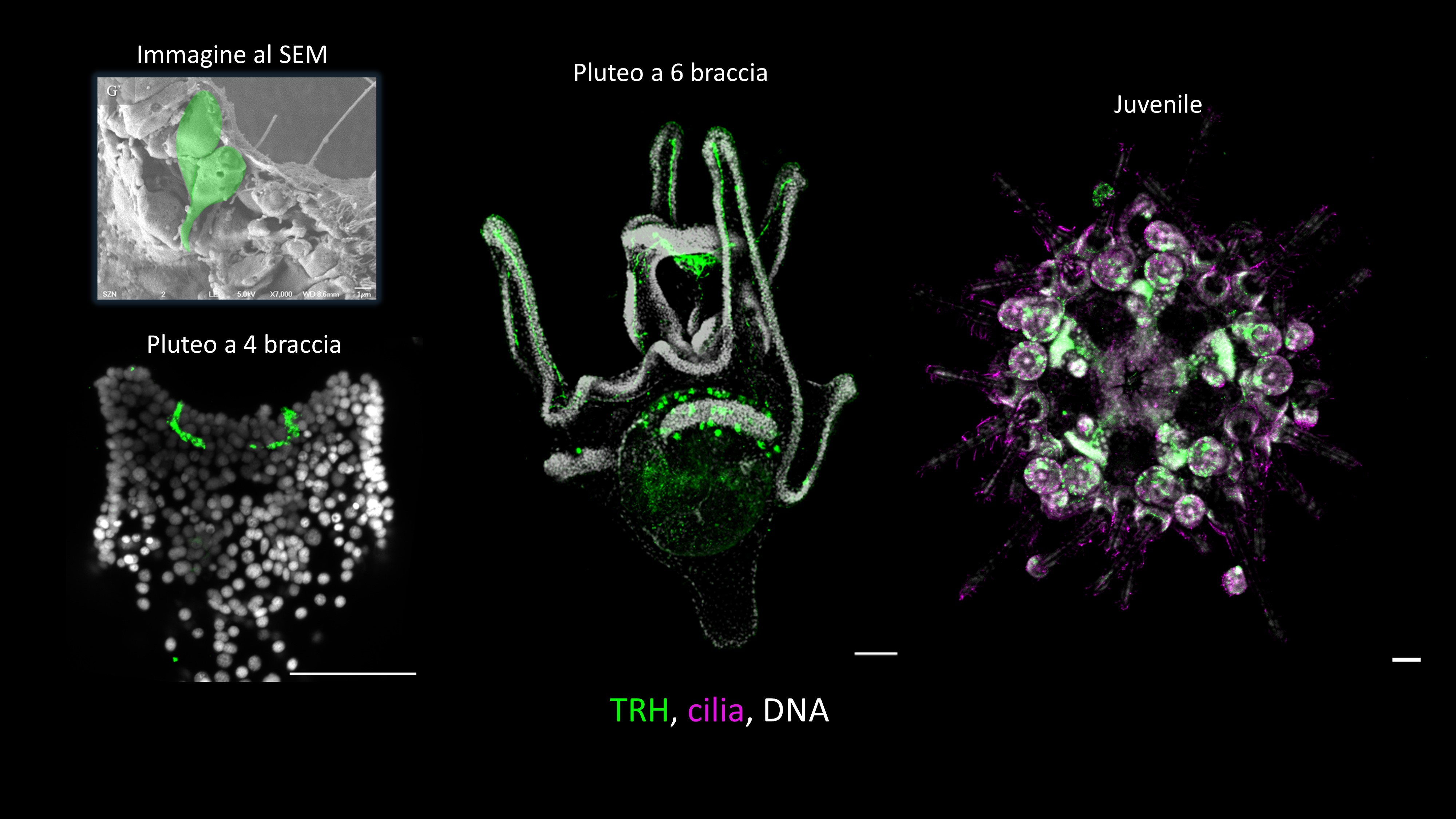
In 1898, Camillo Golgi described the intracellular structure that later took his name, the Golgi apparatus, which we now know to be involved in the transport and modification of proteins destined for secretion. The Golgi apparatus can be formed by single or multiple units; the latter can remain independent or connect to each other in a centralized structure called the Golgi 'ribbon'. The ribbon is generally considered an organization of the Golgi apparatus exclusively present in the cells of vertebrate animals. The reason why the Golgi ribbon has evolved, and its biological functions are not clear. However, in various pathologies, including neurodegenerative diseases, this organization of the Golgi apparatus is lost, indicating its importance for cellular physiology.
Working on cellular secretion, first at UConn Health in the United States and later at University College London in the United Kingdom, Dr. Ferraro has long been fascinated by the Golgi ribbon, hypothesizing that its functions can be deciphered through a comparative biology approach, from an evolutionary perspective. Back in Italy, at the Anton Dorhn Zoological Station, Dr. Ferraro focused his interests on the Golgi ribbon, conducting a study involving numerous colleagues from the Neapolitan institute and research centers in France, Spain, Germany, the United Kingdom, Norway, and the United States (*). The study, recently published in the journal Cell Reports, discovered that far from being exclusive to vertebrates, the Golgi ribbon is present in the cells of many taxonomic groups of animals. These observations indicate that this structure of the Golgi apparatus appeared early in the evolutionary history of animals, before their diversification into the groups existing today. The study also revealed that this structure, initially absent, forms during embryonic development in the sea urchin, ascidian, and amphioxus. This observation suggests the possibility that the Golgi ribbon has a function in embryonic development and that perhaps this is the ancestral role for which it evolved.
By revealing the unexpected and widespread presence of the Golgi ribbon among animals, the study, which relied on interdisciplinary collaboration of zoologists, cellular biologists, evolutionary biologists, and developmental biologists, brings the attention of the scientific community to this enigmatic structure and the importance of deciphering its functions. Future studies in this direction will allow for a better understanding of the role of the Golgi ribbon in the evolution of animal cells and in their physiology, and the consequences of its loss on the course of neurodegenerative diseases and other pathologies.
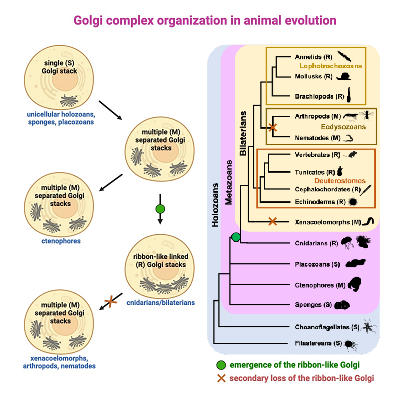
A morphological investigation of the Golgi apparatus in present-day species allowed the identification of the origin of the Golgi ribbon during the evolutionary history of animals in the common ancestor of cnidarians (jellyfish and corals) and bilaterians (all animals with bilateral symmetry).
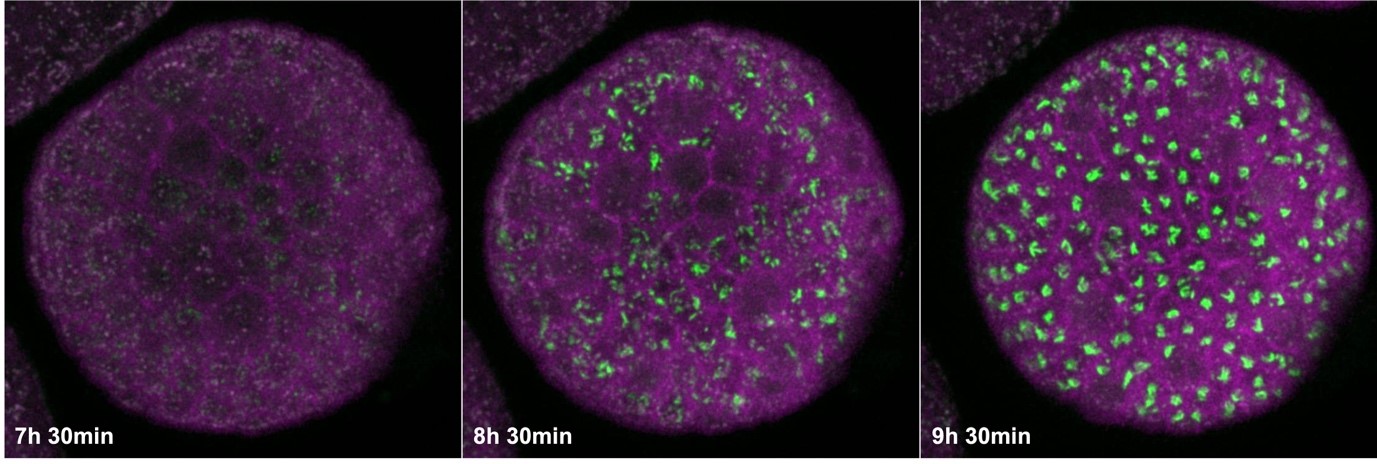
The images show a sea urchin embryo (Paracentrotus lividus) labeled with fluorescent reporters of the Golgi apparatus (green) and the plasma membrane (magenta). It can be observed how the Golgi apparatus, initially present as separate elements in embryonic cells, becomes a single structure, the Golgi ribbon. Times elapsed since fertilization are indicated.
Ream more:
(*) In addition to Francesco Ferraro, the researchers involved in the study were Giovanna Benvenuto, Serena Leone, Emanuele Astoricchio, Enrico D’Aniello, Salvatore D’Aniello, and Ina Arnone from the Anton Dohrn Zoological Station; Sophia Bormke, Jack Ullrich-Lüter, and Carsten Lüter from the Museum of Natural History in Berlin, Germany; Sanja Jasek and Gáspár Jékely from the Living Systems Institute at the University of Exeter in the United Kingdom; Maike Kittelmann from the Department of Biological and Medical Sciences at Oxford Brookes University in the United Kingdom; Kent McDonald from the University of California Berkeley in the United States; Volker Hartenstein from the Department of Molecular, Cell, and Developmental Biology at the University of California Los Angeles in the United States; Valentina Baena from the Department of Cell Biology at UConn Health in Farmington, United States; Héctor Escrivà and Stephanie Bertrand from the Institute of Integrative Biology of Marine Organisms at the Sorbonne University and CNRS in France; Bernd Schierwater from the Institute of Ecology and Evolution at the Hannover University of Veterinary Medicine Foundation in Germany; Pawel Burkhardt from the Michael Sars Centre at the University of Bergen in Norway; Iñaki Ruiz-Trillo from the Institute of Evolutionary Biology at Pompeu Fabra University in Barcelona, Spain. February 29, 2024 DOI:https://doi.org/10.1016/j.celrep.2024.113791
| An expedition to study coastal ecosystems and their response to the environment, from molecules to communities | With LINK (Traversing European coastlines), we embark on a journey through European coastlines to explore the biodiversity and molecular adaptability of microbial communities as well as key selected organisms. We focus on coastal habitats as they are the richest in species biodiversity and they also often present the highest levels of pollution. |
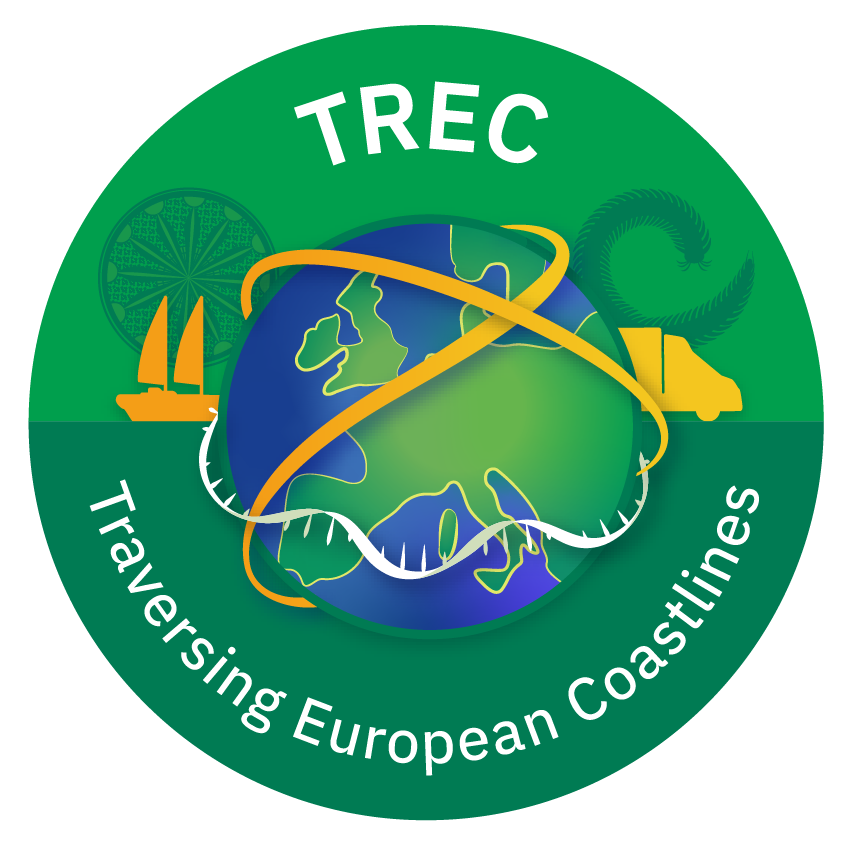 |
|
|
A new era of coastal ecosystems exploration TREC multinational core partners are the European Molecular Biology Laboratory (EMBL), Tara Ocean Foundation and European Marine Biological Resource Centre (EMBRC-ERIC). In Naples, one of the super-sites of the expedition, the Stazione Zoologica Anton Dohrn (SZN) acts as a local hosts, and develops activities in collaboration with NBFC. |
Save the dates and join us! Download the program
Games, guided tours, exhibitions, amusing workshops, are waiting for you
All activities are FREE of CHARGE
SZN organised various Public Engagement activities in cooperation with EMBL and TARA Foundation.
AML (Advanced Mobile Lab)guided tours o - A look inside the TREC's mobile laboratory
Target group: 12 to 99 years old
What: interactive guided tour offering participants the opportunity to explore the Advanced Mobile Lab directly. During the visit, state-of-the-art AML equipment will be showcased, and participants will have the chance to observe some mini-experiments up close.
Where: AML, seaside of the main SZN building.
When: May 11, 3:00 PM – 8:00 PM
MANDATORY RESERVATION HERE
TARA at Molo San Vincenzo
Three activities will take place near the TARA schooner:
Where: Molo San Vincenzo (Marina Militare).
When: May 11, 10:00 AM - 1:00 PM and 3:00 PM - 8:00 PM
ATTENTION!! LIMITED ACCESS WITH MANDATORY FREE RESERVATION TO ACCESS THE PIER AT THE FOLLOWING LINK
• Guided tours on TARA - Discovering TARA
Target group: 8 to 99 years old
What: An interactive guided tour offering participants the opportunity to explore the Goletta TARA up close, understanding what it is, what it does, and what life and work are like on board.
• Observing the invisible inhabitants of the ocean - Hands-on workshop with a portable microscope
Target group: 8 to 99 years old
What: An experience to discover an essential world for life on Earth, the marine microbiome, by observing local seawater samples with the Curiosity microscope, understanding the importance of the marine microbiome, and why it needs to be studied for better protection.
• Plastic in the sea, solutions are on land - Interactive play-information about plastic pollution
Target group: 8 to 99 years old
What: A workshop based on games to trace the source of plastic pollution and associated chemical pollutants and find solutions. Observe plastic in its various forms, breake downpreconceived ideas, and discover your power to make a difference.
Trec in the City – Science and fun around Naples
Three engaging activities that will pique your curiosity and provide entertainment, don't miss the opportunity!
Where and When:
Piazza Municipio, May 4, from 15:00 to 19:00
Città della Scienza, May 5, from 09:00 to 17:00
Mostra D'Oltremare, May 7, from 16:00 to 19:00
Rotonda Diaz, May 8, from 16:00 to 19:00
Mostra D'Oltremare, May 9, from 16:00 to 19:00
Rotonda Diaz, May 10, from 16:00 to 19:00
Piazza Municipio, May 11, from 15:00 to 19:00
Mostra D'Oltremare, May 12, from 15:00 - 19:00
• Curiosity hand-held microscope
Target group: 6 to 99 years old
What: Have you always wanted to use a microscope? Come and visit us and you'll discover the invisible! This traveling exhibition stand offers practical experiences and "wow-science!" on microscopy. Thanks to a portable microscope, you will see real samples from the TREC expedition, thus observing plankton in a unique and fun way!
• Run, Scientist, Run! - Scientific Goose Game
Target group: 4 to 99 years old
What: Come and play a giant goose game to discover the secrets of a scientific expedition! You will experience the challenges and successes of sampling for a scientific expedition.
N.B The game "Run, Scientist, Run" will be held at all locations except for Piazza Municipio.
• The Ocean, this Unknown - Exhibition
Target group: 8 to 99 years old
What: An exhibition, conceived as a journey, composed of 6 illustrated panels to convey a key message: the Ocean is the central ecosystem of our planet.
Nexus Island
Target group:12 to 99 years old
What: An interactive, game-based workshop focused on the health of the planet. Just like a scientist, you will take part in an expedition to discover, collect, and study the organisms of the coastal areas of an island... will you be able to save it?
Where: Città della Scienza
When: May 5, 9:00 AM - 5:00 PM
Science without Frontiers - round table on TREC with live illustrations
Target group: 18 years old and above
What: On the occasion of Europe Day, the Tara Ocean Foundation and the Institut Français Napoli invite you to a roundtable discussion on TREC, an expedition that transcends geographical, disciplinary, and ecosystem boundaries. The roundtable features Douglas Couet, marine biologist from CNRS, France; Iole di Capua, marine biologist from SZN, Italy; Anne-Marie Alleaume, professional communicator from the Tara Ocean Foundation, France. The discussion will be illustrated in real-time by the Belgian artist François Olislaeger.
Where: Institut Français Napoli (via Francesco Crispi 86).
When: May 9, at 6:00 PM
Science in Travel - Scientific Conversations with and for the Public
Target group: 18 years old and over
What: Join us for a fun, informal, and accessible evening where scientists from across Europe come together to discuss with you! A sharing moment during which the TREC project - and science in general - is discussed with the public. Scientists, including those from SZN, take the "stage" and present various topics related to the marine world and the Trec-TARA expedition.
Where: Lo Spark Café di Napoli (Piazza Bovio, 33).
When: May 10, at 6:00 PM
PlanktoQuest - Virtual Reality Experience on Plankton
MANDATORY RESERVATION HERE
Target group: 8 to 99 years old
What: Plankton as you've never seen it: immerse yourself in an augmented reality experience that will allow you to "touch" the invisible! PlanktoQuest is a virtual reality animation that allows the user to explore and manipulate marine plankton with their hands. The user can stretch, section, feed different plankton organisms and enter inside them with only hands and a headset (no computer, no controller).
Where: Stazione Zoologica Anton Dohrn
When: May 11, 9:00 AM – 4:30 PM and May 12, 9:00 AM - 12:30 PM
 |
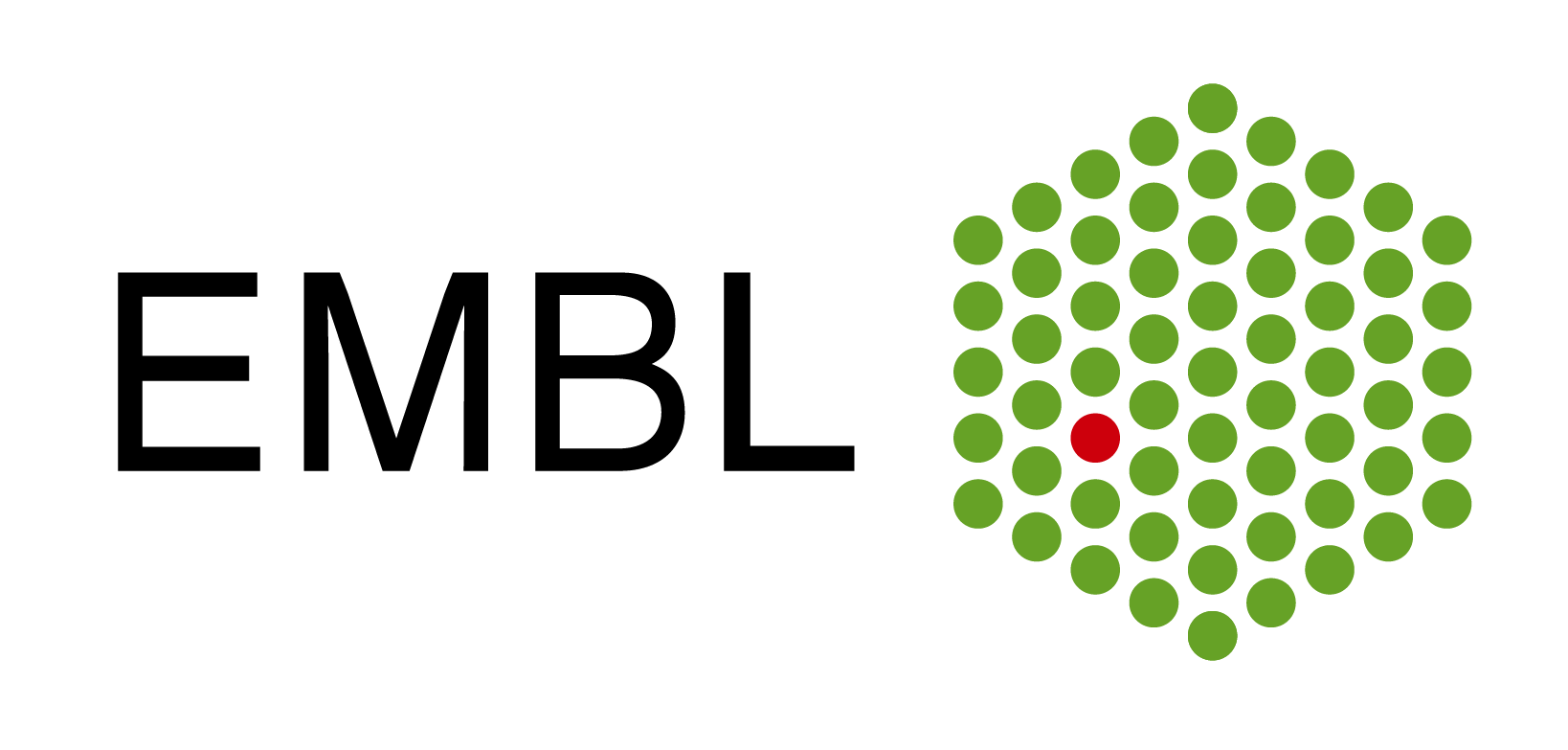 |
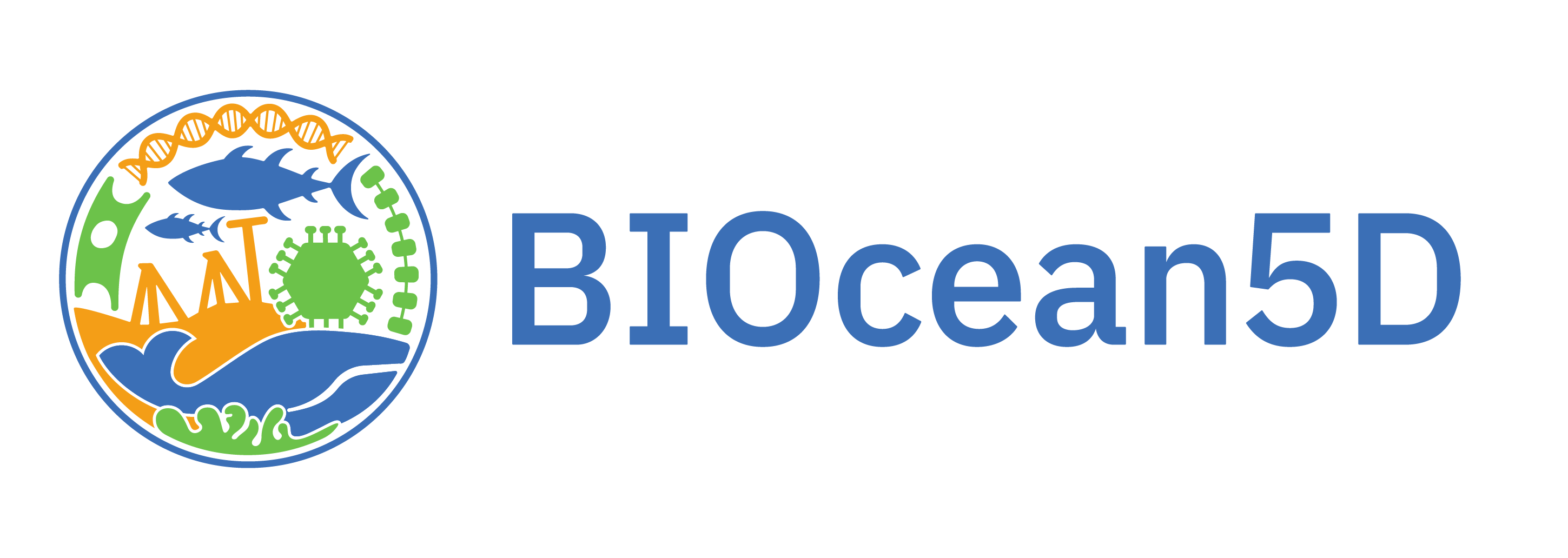 |
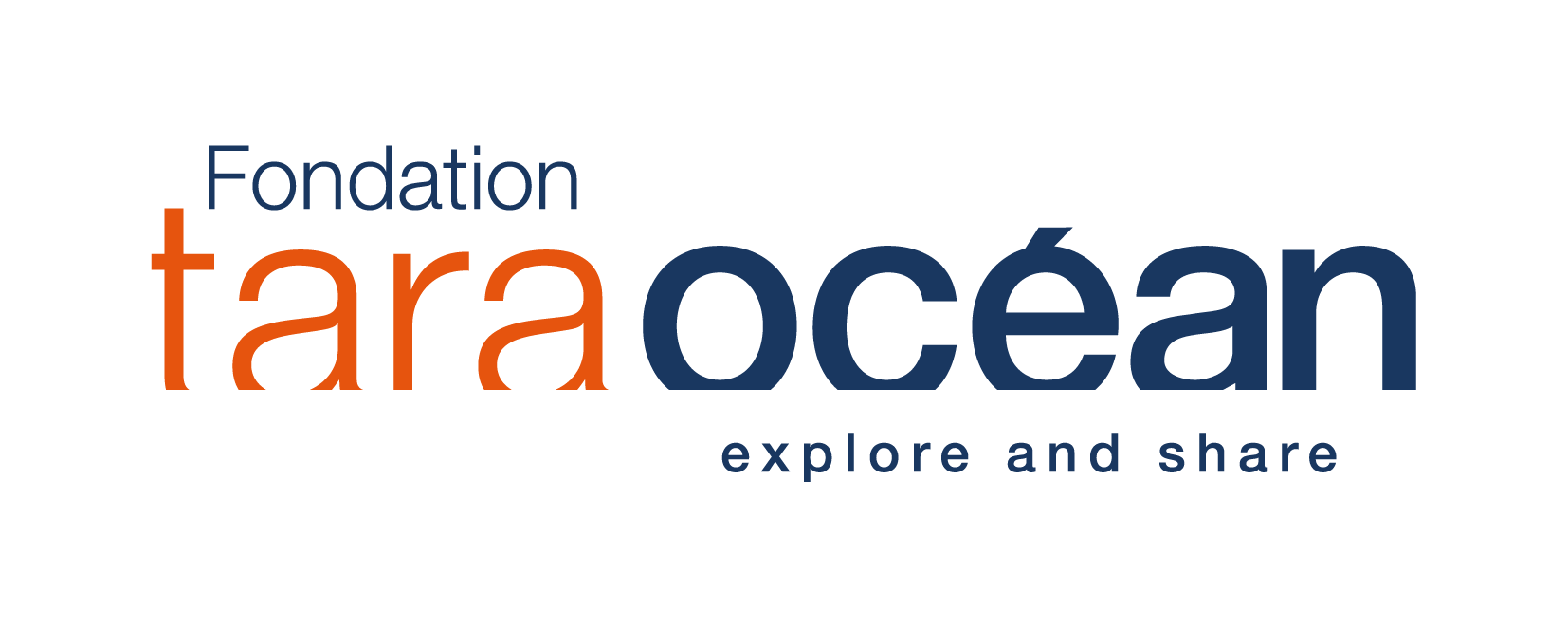 |
 |
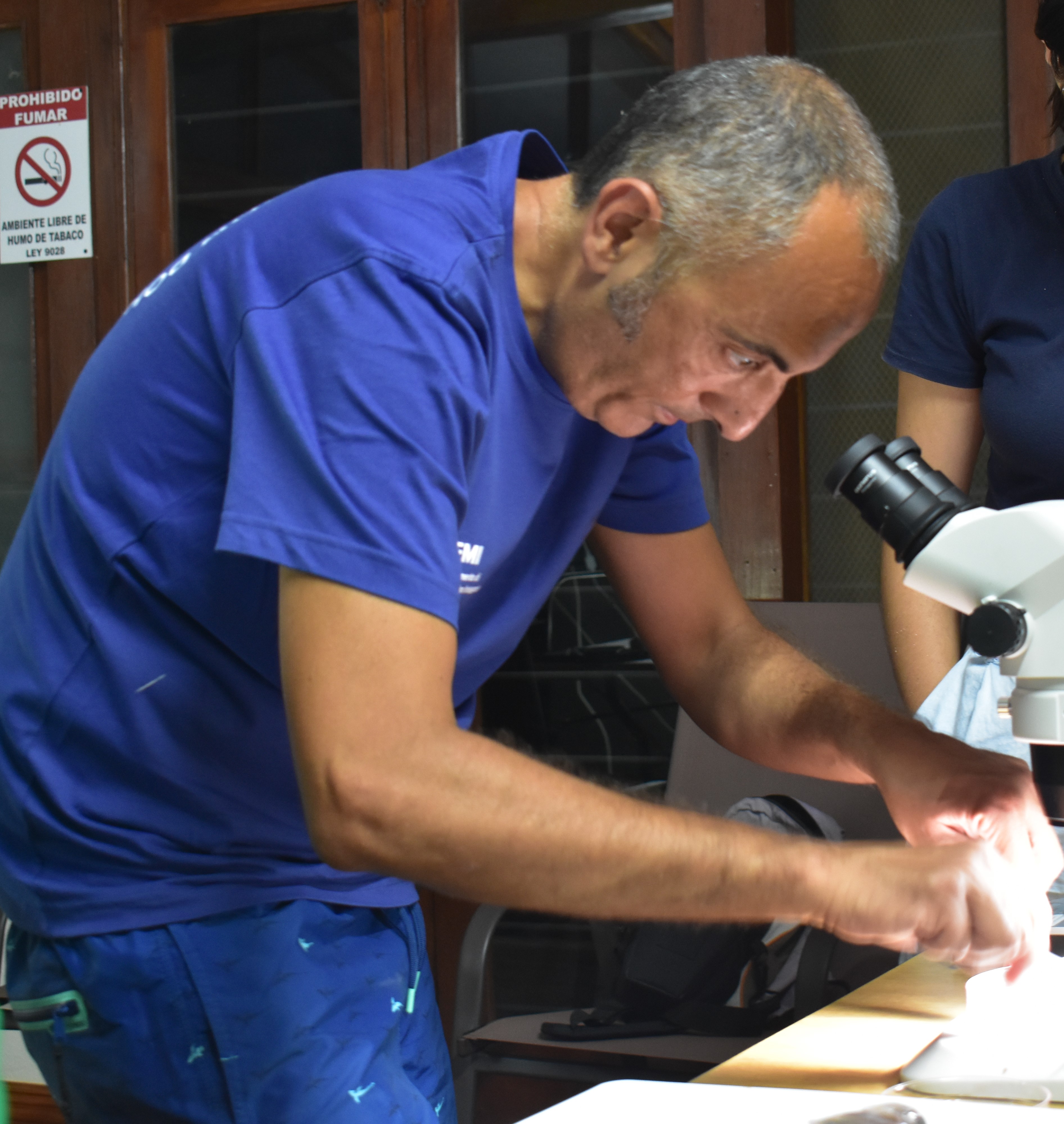
A team from the Stazione Zoologica Anton Dohrn, led by researcher Ulisse Cardini from the Department of Integrative Marine Ecology, has published a new scientific study exploring the role of symbioses between marine plants and their microscopic partners, and how ocean acidification affects their nutrition
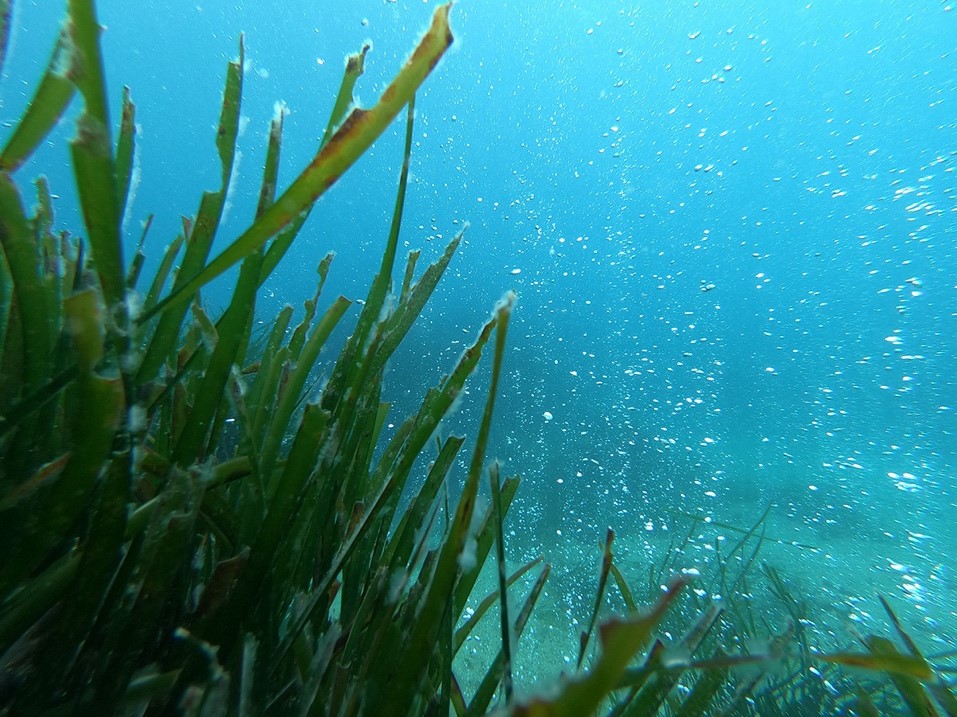 Seagrass beds are biodiversity-rich ecosystems, similar to underwater gardens, that are vital to the life of the oceans and marine creatures. However, they are now facing a growing threat: ocean acidification. This is caused by the excessive dissolution of carbon dioxide, which is mainly produced by human activities.
Seagrass beds are biodiversity-rich ecosystems, similar to underwater gardens, that are vital to the life of the oceans and marine creatures. However, they are now facing a growing threat: ocean acidification. This is caused by the excessive dissolution of carbon dioxide, which is mainly produced by human activities.
To better understand the impact of such acidification on the nutrition of marine plants, an innovative study has focused on the Mediterranean seagrass Posidonia oceanica and the role of its microscopic symbionts. Scientists used carbon dioxide emissions from volcanic activity near the island of Ischia, Italy, to study this plant and its symbionts under acidic conditions not far from those predicted for the future of the oceans.
Dr Ulisse Cardini from the Stazione Zoologica Anton Dohrn at the Genoa Marine Centre led this important work in collaboration with researchers from the University of Bremen in Germany, the Institute for Biological Resources and Marine Biotechnology - CNR Ancona, the University of Aarhus in Denmark, and the University of Southern Bohemia in the Czech Republic.
The researchers made a surprising discovery: despite the rising acidity levels, Posidonia meadows demonstrate remarkable resilience in the nitrogen cycle, which is crucial for their growth. The leaves of these seagrasses have become highly effective powerhouses for nitrogen transformation, involving a wide range of symbiotic microorganisms, including bacteria and archaea.
Even more interesting, comments Dr Ulisse Cardini, was the observation that, despite the increasing acidity, these microorganisms not only remain active but also accelerate many crucial processes. Marine plants benefit from the increase in carbon dioxide for photosynthesis and sugar production, while the microorganisms promote protein synthesis through increased nitrogen acquisition.
However, Dr Cardini further explains, this nutritional advantage is not without risk, as it can increase the risk of predation by herbivores and other organisms. This delicate balance highlights the importance of studying the processes that regulate the health and resilience of marine ecosystems in detail.
In conclusion, this study offers valuable insights into how marine plants and their microbes adapt to ocean acidification. It highlights the significance of safeguarding these ecosystems, which are vital for mitigating climate change and conserving ocean life for future generations.
Team Stazione Zoologica Anton Dohrn
Ulisse Cardini (EMI), Johanna Berlinghof (EMI e Università di Brema), Luis Montilla (EMI), Friederike Peiffer (EMI), Ugo Marzocchi (EMI e Università di Aarhus), Francesca Margiotta (RIMAR), Maria Abagnale (RIMAR)
Original publication
Johanna Berlinghof, Luis M. Montilla, Friederike Peiffer, Grazia M. Quero, Ugo Marzocchi, Travis B. Meador, Francesca Margiotta, Maria Abagnale, Christian Wild & Ulisse Cardini. Accelerated nitrogen cycling on Mediterranean seagrass leaves at volcanic CO2 vents. Communications Biology 7, 341 (2024). https://doi.org/10.1038/s42003-024-06011-0
Project funding
This research was supported by a Ph.D. fellowship co-funded by the Stazione Zoologica Anton Dohrn (SZN) and the University of Bremen (to J.B. and F.P.), a Ph.D. fellowship funded by the Open University – SZN Ph.D. Program (to L.M.M.), and a SZN postdoctoral fellowship (to U.M.). U.C. was partially supported by the Italian PRIN 2022 project ENGAGE (grant n. 20223R4FJK) and PRIN 2022 PNRR project BORIS (grant n. P2022R739J), funded by the European Union – Next Generation EU.












